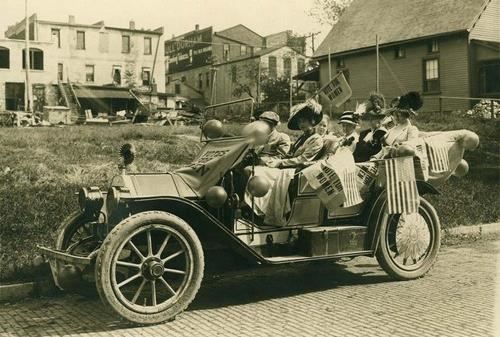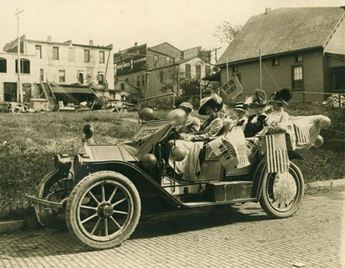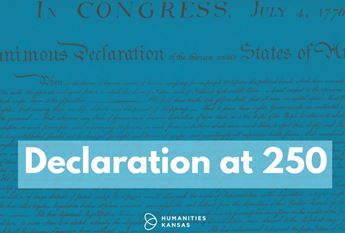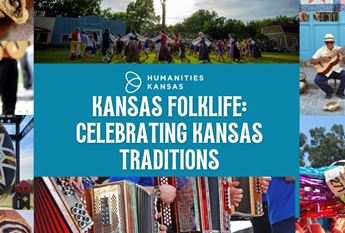

I Am Woman, Hear Me Roar
August 15, 2019
“Resolved that Kansas cannot be truly free while the words ‘white’ or ‘male’ are found within the limits of her constitution,” so reads the constitution of the Moneka Woman’s Rights Association, an organization established by abolitionists in Linn County, Kansas Territory, in 1857. The association believed so strongly in suffrage that they engaged Clarina Nichols, a seasoned activist and journalist, to attend the Wyandotte convention and advocate for women’s rights to be included in the state constitution. Thanks in large part to the efforts and persistence of Nichols, the Kansas constitution guaranteed women the rights of child custody, property rights, and the right to vote in school elections—rights the majority of women in the United States did not have.
HK awarded the League of Women Voters (LWV) of Kansas a Humanities for All grant in support of the 19th Amendment Centennial. The traveling exhibit documents women’s right to vote in Kansas and nationally, the history of the League of Women Voters, and the impact of the enfranchisement of women on society.
While women nationwide received the vote after decades of agitation and lobbying with the ratification of the 19th amendment in 1920, women in Kansas gained incremental suffrage beginning with statehood. In 1887, mere months after women received the right to vote in municipal elections, Kansans elected the first female mayor in the country.
Susanna Madora Salter’s election as mayor began as a joke. A few of the men of Argonia, in Sumner County in south central Kansas, placed Salter’s name on the ballot. At the time Salter served as the president of the local chapter of the Women’s Christian Temperance Union (WCTU) and her detractors were hoping to humiliate her and the WCTU when she didn’t receive any votes. Instead, Salter, a 27-year-old mother of four, garnered two-thirds of the vote and gained national attention as the first female elected to serve as mayor.
Salter received congratulations and jeers alike as mayor of Argonia. One critic sent her this ditty: “She, in her weak attempts to rule, makes herself a mark for ridicule.” While an admirer wrote, “My dear, you don’t know what a prominent figure you are in history.”
Salter must have had some idea of her importance when in the fall of 1887 she was asked to appear at the Kansas Women’s Equal Suffrage Association Convention and shared the stage with none other than Susan B. Anthony!
As the 19th Amendment Centennial exhibit shows, Kansas women continued to fight for full voting rights throughout the 19th and into the 20th centuries. Mamie Dillard, a schoolteacher and school principal who taught Langston Hughes, joined the African American WCTU in Lawrence in 1892 at the age of 18 because of the organization’s strong stance on suffrage. Dillard, along with other Kansas women, contributed in a multitude of ways to advancing female enfranchisement. For example, Mrs. C. W. (Lizzie) Smith of Stockton in north central Kansas proudly noted of her support of the suffrage amendment to the Kansas constitution in 1912, “I have sold two dozen eggs, ten pounds of butter, one peck of crab apples, and engaged two pecks more. This goes to the suffrage fund.”
Through the dedication of women like Dillard and Smith, Kansas women received full state suffrage in 1912, eight years before the 19th amendment was ratified.
Even after state suffrage was granted, women such as Topekan Harriet Harper advanced the cause of national voting rights for women. In 1916, Harper served on a panel advocating suffrage at the National Association of Colored Women Conference. In 1919, Jane Brooks of Wichita was elected as the first president of a new national organization—the League of Women Voters.
The ratification of the 19th amendment in 1920 gave women the right to vote, but it did not end the fight for equal rights as many women of color who could legally vote were systemically disenfranchised; however, it did open the door for women to enter the political arena. Kansans such as Georgia Neese Clark Gray and Lucinda Todd impacted politics and society in Kansas and the nation. Gray, born in Richland, became the first female Treasurer of the United States in 1949. Todd, as treasurer of the Topeka chapter of the NAACP, organized her community to fight segregated schools eventually leading to the landmark Brown v Board US Supreme Court case ending segregation nationwide.
The 19th Amendment Centennial exhibition will be on display in Topeka on August 22 and Wichita on August 24. Additional venues across the state will host the exhibition through December 2020. Follow Centennial Celebration of the 19th Amendment on Facebook for location updates and details.
Join the Movement of Ideas
Preserve the history of the suffrage movement. Transcribe the correspondence of national women’s rights leaders such as Susan B. Anthony as part of the Library of Congress’s Summer Suffrage Challenge crowdsourcing project.
View the 19th Amendment Centennial traveling exhibit in Topeka on August 22, Wichita on August 24, and more Kansas communities in 2019 and 2020. Find details and information about upcoming exhibit venue on the HK Calendar of Events.
Bring a presentation and discussion women’s rights to your community with HK Speakers Bureau topics including Sarah Bell’s “A Congress for Women: Women’s Clubs and the Chautauqua Movement” and Diane Eickhoff’s “The Long Road to Women’s Suffrage in Kansas.”
Read the minutes for the Moneka Woman’s Rights Association, dating from 1858 to 1860, on Kansas Memory.
Listen to archiver podcast "Women and Sunflower Politics."
Photo courtesy of KansasMemory.org, Kansas Historical Society.
Gallery
 View
View



